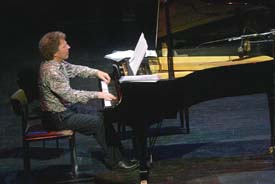 Naar Nederlands
Naar Nederlands 
P R E S S R E P O R T S
Netherlands pianist Marcel Worms plays a world of tango at the Masrah al-Madina with Lebanese dancers and Soumaya Baalbaki to boot
By Jim Quilty
Daily Star staff
Saturday, May 28, 2005

BEIRUT: Masrah al-Madina hosted an instructive and at times amusing evening of tango on Thursday. The featured artist was Dutch pianist Marcel Worms. This was his second night at the Madina, having performed a blues program the previous evening. Tango was born in Argentina, they say, but, as Dutch Ambassador Gerard J. van Epen explains while introducing Worms to the audience, it has lodged itself in the heart of the Netherlands since the country welcomed the Argentine native Princess Maxima into the royal family. For his part, Worms reassures the audience that tango was so pervasive that even cold-blooded Dutchmen like himself had warmed to the form.
The Dutch pianist's program is divided between the didactic and the collaborative.
Before the interval, the audience is given a musical seminar on the history of tango - starting with Russian composer Igor Stravinsky's "Tango," then following a casual arc that samples its 19th- and 20th-century incarnations, ending in some pieces by Argentina's great 20th-century innovator in the form, Astor Piazzolla.
Perhaps the most pleasant surprise of the first half of the program is Leopold Godowsky's piano transcription of Isaac Albeniz' "Tango," which is more generally heard played on Spanish Guitar.
Worms is a warm and transparent performer. He enjoys discussing his music and is effusive in introducing his collaborators - the handheld microphone he repeatedly struggles to turn on providing the prop for the show's running gag.
He engages each tango with a smile, though he seems a little fatigued during this show. If the tone of a piece isn't up to his standards, he will wince. If a note is misplaced, a grimace of regret registers on his face. At the end of one piece he seems to make a quiet remark to the sheet music before rising for a self-deprecating bow. When a piece comes off crisply, he bows more deeply and definitively than if it doesn't.
By the time Worms arrives at "Quasitango," a piece Dolf de Kinkelder composed for him in 2002, the pianist is fully engaged and even dramatic in his performance.
Worms likes working with local artists when he tours and he shares the stage of the Madina with three of them. As the media recognizes tango as a dance form, after the interval dancers Daniel and Rita Haddad join him on stage for several numbers. Since she has a dynamite voice, Beiruti chanteuse Soumaya Baalbaki takes the stage for a few well-known standards - which all betray how elements of the tango infiltrated the pop music of the 20th-century Middle East.
The Haddads first take the stage for Osvaldo Pugliese's "la Yumba." Their interpretation is more tango-inspired than tango per se. Though many of the steps are recognizably "tango," and the pair do capture a sense of the aloofness that characterises some species of the dance, there is none of the intimacy and sensuality that partners the poise.
It seems the couple tries to compensate for their innocence with athleticism - she is taken up more than once for a bit of sustained swinging about - but the effect is more "ice dance" than "tango." Primarily, though, there is a strong sense that the couple are rehearsing a set routine rather than engaging with the music, testified by the fact that they tend to stop dancing a beat or two before Worms actually finishes playing.
Baalbaki's contribution reverberates more solidly. She comes to the stage only twice and sings only four tunes altogether but her sweet voice - slightly higher in the register than that of Fairouz (the godmother of Lebanon's female vocalists) - rings out so powerfully as to challenge the theater's sound engineering.
It is at this point that the concert gels to best effect. There is affable communication between singer and pianist as they perform Layla Mrad's "Outloub Enayya" and Farid al-Atrash's "Ya Zahrantan," with the innate tango rhythms in the foreground. Afterward, more than one audience member comments that it hadn't occurred to them that these Arabic standards were tangos at all.
Perhaps the sweetest moment in the concert comes when Worms collaborates with the soundman at the back of the hall to invoke the voice of Carlos Gardel, on vinyl. Worms describes the Argentinian composer, vocalist and film star as a sort of Latin American answer to Atrash - it seems when he died in 1935 a number of his female fans committed suicide.
Baalbaki returns to collaborate with Worms on a Masrah al-Madina version of Mohammad Abdel-Wahab's "Sahertou," and the Rahbani Brothers' classic Fairouz piece "Ya Zanbak." The Haddads return to the stage to interpret the Rahbanis. The pair seem more relaxed with this music, somehow. At least they and the pianist conclude their exertions at the same moment.